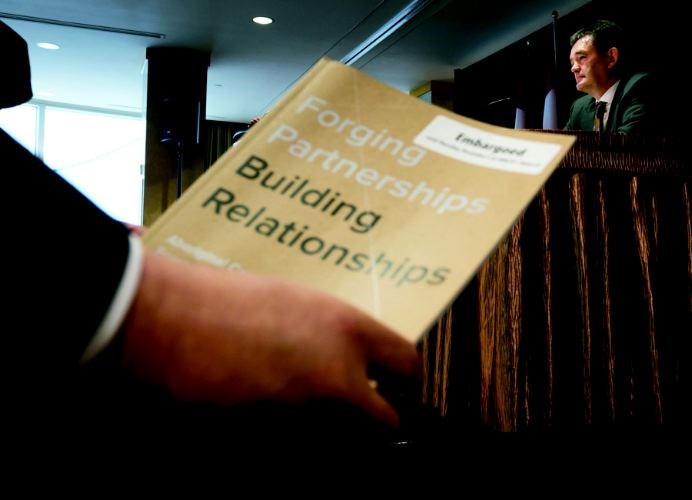Prime Minister Stephen Harper's special envoy to B.C. and Alberta First Nations, Doug Eyford, said in his report released Thursday that the federal government must do more to ensure First Nations voices are heard as oil and gas pipeline proposals to the west coast are discussed.
Although his mandate didn't include discussions around any specific project, Eyford said to date the federal government hasn't done a good enough job meeting with and listening to concerns of First Nations.
"We are all presented with a choice: to maintain the status quo or embrace the opportunities and potential offered by a different path," Eyford wrote in his 54-page report. "The people I met have expressed an interest in working together to move forward which leads me to believe progress can be achieved."
Carrier Sekani Tribal Council Chief Terry Teegee said Eyford's report struck the right notes, but he noted the pressure is now on the federal government to act quickly and implement its recommendations.
"I think there's a definite disconnect between Ottawa and the First Nations out in British Columbia in terms of these many oil and gas projects and I think Doug Eyford laid that out quite well in terms of their commitment to dealing with First Nations out here," Teegee said.
Among the ideas Teegee would like to see acted upon quickly is the creation of a tripartite energy working group, which would involve the federal and provincial governments as well as First Nations leaders.
According to Eyford, such a body would be a venue for the three groups to work co-operatively and perhaps find "flexible and innovative models" to allow aboriginals to participate in planning, training and employment programs.
Federal Natural Resources Minister Joe Oliver accepted Eyford's report Thursday, but said the government would have to thoroughly examine it before deciding how it would act on any of the recommendations.
"I can't give a specific time, the only thing I can say is we're on it now, we take it seriously, we understand these issues need to be addressed in a timely manner," Oliver said in a phone interview, but his government must work quickly because decisions on the multi-billion dollar oil and gas projects are expected soon.
Skeena-Bulkley Valley NDP MP Nathan Cullen was impressed with the recommendations in the report, but was surprised the government isn't ready to act immediately. Eyford delivered his report to the government at the end of November, which Cullen said should have given it enough time to evaluate its contents.
"I'm surprised the government isn't launching either this tripartite group that this report talks about, or something else concrete," he said. "If they just kick the ball around for a couple more months, they're sending a signal that we'll say it's a priority but we're not going to treat it as one."
Both Teegee and Chief Martin Louie of the Nadleh Whut'en First Nation said if governments are committed to implementing Eyford's report, then Harper and B.C. Premier Christy Clark should take up the offer of First Nations leaders for face-to-face meetings.
Teegee said he's requested meetings with both leaders since they were elected, but so far has been shut out. He said he would find it disheartening that after Eyford's call for more constructive talks, that his calls for meetings still go unanswered.
Louie said in the past consultation has always been framed by legislation created by governments, but he would like to see more open discussions in the future.
"They have to come to a realization that without talking to us and consulting with the First Nations that no project is going to go ahead no matter how much they figure they're going to be making," Louie said.
Oliver remains hopeful that the report will open the door to better relations in the future, which could allow for collaborative discussions on how to get resource projects off the drawing board and into construction.
"I think by presenting recommendations for how we can enhance the Crown-First Nations relationship, that has to be positive in terms of their receptivity to development, but development has to protect the environment and be respectful of their rights and economic interest," he said.



